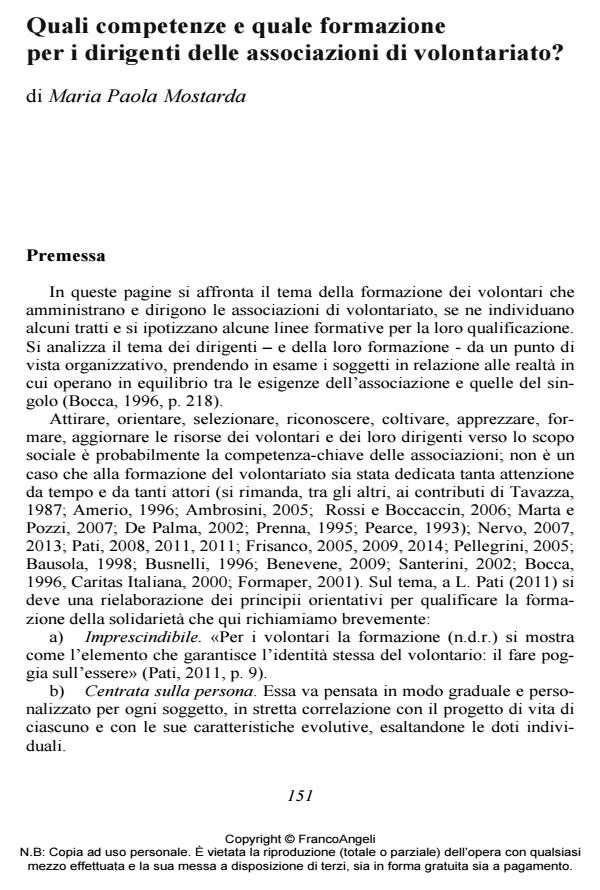Quali competenze e quale formazione per i dirigenti delle associazioni di volontariato?
Titolo Rivista EDUCATIONAL REFLECTIVE PRACTICES
Autori/Curatori Maria Paola Mostarda
Anno di pubblicazione 2017 Fascicolo 2017/1
Lingua Italiano Numero pagine 15 P. 151-165 Dimensione file 201 KB
DOI 10.3280/ERP2017-001010
Il DOI è il codice a barre della proprietà intellettuale: per saperne di più
clicca qui
Qui sotto puoi vedere in anteprima la prima pagina di questo articolo.
Se questo articolo ti interessa, lo puoi acquistare (e scaricare in formato pdf) seguendo le facili indicazioni per acquistare il download credit. Acquista Download Credits per scaricare questo Articolo in formato PDF

FrancoAngeli è membro della Publishers International Linking Association, Inc (PILA)associazione indipendente e non profit per facilitare (attraverso i servizi tecnologici implementati da CrossRef.org) l’accesso degli studiosi ai contenuti digitali nelle pubblicazioni professionali e scientifiche
This article addresses the subject of training for democratically elected volunteers (and therefore not the paid managers or directors) who administer and manage associations. It identifies certain traits of these individuals and proposes educational guidelines for their training in light of Italian and international studies. In a field short on data and systematic research, this analysis acknowledges certain features of administrators: volunteerism, partial availability, freedom, support and auditing, vision; each one has specific pros and cons. Based on these characteristics, the following educational approaches are proposed: pedagogical training, which can be helpful in identifying areas to include in the managers’ individual programs, recognizing the skills they possess and those upon which they can improve; sustainable training, in keeping with a volunteer who donates his or her time, reconciling it with his or her other commitments; specific training, in order to occupy this strategic role shifting between state, profit, and nonprofit with a full-fledged identity; multidisciplinary training, to support the array of skills needed in this role; cooperative training aiming at providing the management with the skills to interact with paid and non payed staff, with different nonprofit organizations and institutions; continuous and reflective training, to craft the ability to interpret change and redirect associations by viewing reality through new eyes. Training shortcuts focused on managing for profit or institutional bureaucracy do not appear to contribute in volunteerism. This reshaped training offered for the governing boards opens the door to collaborative training opportunities among a wide range of training agencies committed to supporting volunteerism and to fully fulfilling this role, which is fundamental to democratic life and helps bind society together.
- Riflettere per agire: il diario di bordo come strumento di formazione trasformativa nel volontariato del Terzo settore Fabio Casna, in IUL Research 2/2025 pp.73
DOI: 10.57568/iulresearch.v6i11.680
Maria Paola Mostarda, Quali competenze e quale formazione per i dirigenti delle associazioni di volontariato? in "EDUCATIONAL REFLECTIVE PRACTICES" 1/2017, pp 151-165, DOI: 10.3280/ERP2017-001010